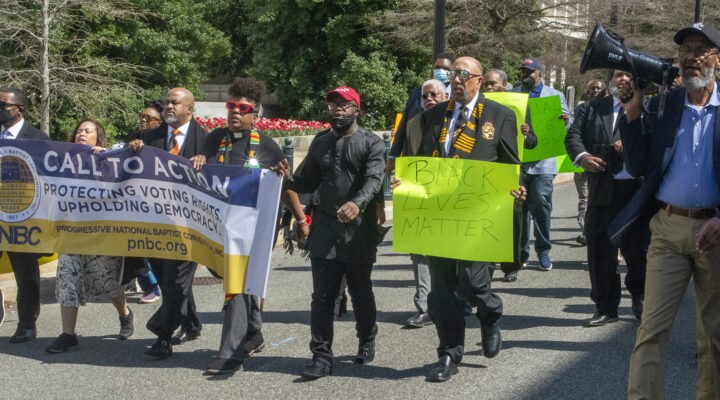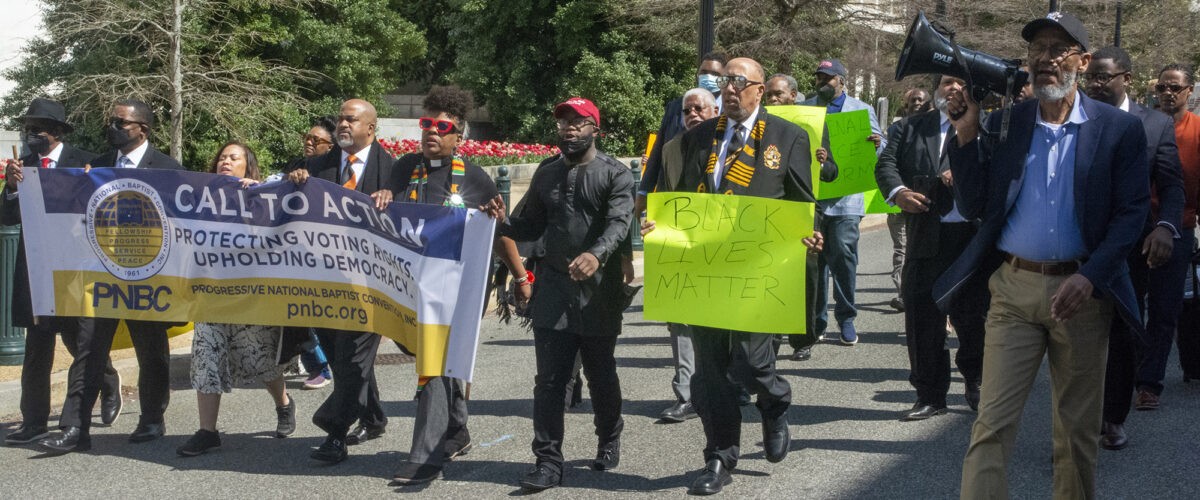The Progressive National Baptist Convention is leading the way on efforts to protect voting rights, speaking out across the country and releasing an innovative tool kit to help others make a difference.
On March 21, PNBC leaders and clergy from across the country gathered in Washington, D.C., to make their voices heard on key issues, including the crisis unfolding in Ukraine and the urgency for Congress to pass the John Lewis Voting Rights Advancement Act and the For the People Act.
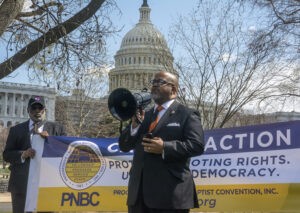
David Peoples leading the group at the Capitol.
“As the denominational home of the Rev. Dr. Martin Luther King Jr., it is in our DNA to speak up and speak out regarding social justice and the rights of all people,” said David Peoples, PNBC president and pastor of Jabez Missionary Baptist Church in Lexington, Ky.
“We at PNBC are answering the call to stand for justice for all God’s children — here in our country’s court systems, in ensuring access to the ballot box, and in conflicts around the world, including Ukraine and Ethiopia,” he said.
Kicking off the call to action with a news conference in Washington, the group later marched down Constitution Avenue to hold a rally in front of the U.S. Capitol.
The gathering coincided with the first day of confirmation hearings for Supreme Court nominee Judge Ketanji Brown Jackson, and leaders emphasized the importance of having representation on the U.S. Supreme Court.
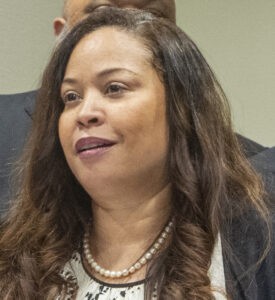
Heather Taylor
“In this nation, we’ve had 115 persons serve on the Supreme Court, and only four of them women, only three persons of color,” said Heather Taylor, a member of the PNBC Social Justice Commission. “That means for centuries, the interpretation and application of our laws in this nation have been dominated by the perspective of the white male.”
Taylor said she did not seek to degrade the perspective or moral compass of white men, but rather to affirm that the integration of the perspective of Black women is long overdue, and that perspective matters.
“We must ensure that the court is representative of the diversity of people it is intended to protect,” she urged.
Frederick Douglass Haynes III talked about the threats to voting rights across our country, especially in his home state of Texas. As co-chair of the PNBC Social Justice Commission, Haynes also serves as senior pastor of Friendship-West Baptist Church in Dallas.
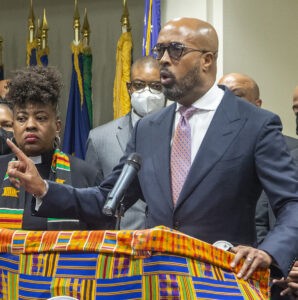
Freddie Haynes
“Senate Bill 1 passed and became law, rooted in a lie,” Haynes said, noting that lies about the 2020 election being “stolen” have led to a crop of new bills to restrict voting rights since the Jan. 6 Capitol insurrection. According to PNBC, 48 states have introduced 389 bills since January 2021 that would create more voting restrictions.
In Texas, Senate Bill 1, which became law in fall 2020, adds measures that would make it more difficult to vote in Texas, including reducing voting hours, adding new ID requirements, complicating the process for mail-in ballots and more.
“I’m from Texas, and I’m saying there is something sick and sinful that there are too many Texans who found their requests for a mail-in ballot rejected,” Haynes said, speaking of this month’s Texas primaries, the first in the nation for the current cycle.
Haynes called for voting rights legislation that will protect every American: “Are you going to be America for all, or for the ‘y’all’ who engage in the politics of ruin or rule? And, if we are going to be America, then America will be a land of liberty and justice for all.”
PNBC supports the John Lewis Voting Rights Advancement Act, which would ensure that any change to local or state elections must be federally reviewed — a process known as “preclearance,” which was part of the original Voting Rights Act of 1965. In 2013, the Supreme Court decision in Shelby County v. Holder gutted the Voting Rights Act, calling on Congress to update the formula used to determine which areas were required to seek preclearance. In the eight years since, Congress has not acted further.
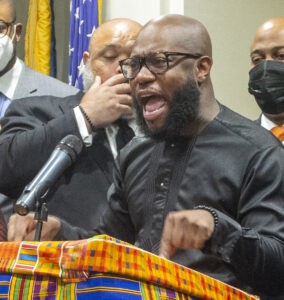
Willie Francois
Willie Francois III, co-chair of the PNBC Social Justice Commission, also called on Congress to ensure voting rights for all. The senior pastor of Mount Zion Baptist Church in Pleasantville, N.J., he referred to PNBC’s leadership in previous civil rights legislation in the 1960s and how that work continues.
“We are saying today: Congress, don’t just want Black votes. Do something about Black lives with your pen and with your legislation, because you cannot be more interested in protecting your procedural vote until you take seriously our votes that put you in office in the first place.”
Barbara Williams-Skinner, co-convener of the National African American Clergy Network and CEO of the Skinner Leadership Institute, talked about protecting democracy around the world. She noted that it’s troubling to watch the country focus on issues in Europe while turning its back on African and Haitian nations.
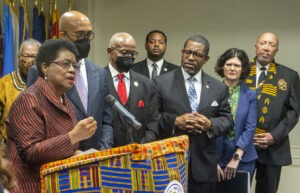
Barbara Williams-Skinner
She also noted the importance of access to voting for everyone in the country: “Today we say to Congress: The eyes of the world are on you. Do not lecture the world about democracy and put a stop on the ballot box to people of color, the elderly, the disabled, the returning citizens, students, and to say, ‘This is America.’”
“We’re not too tired to keep on marching,” she said.
The group gathered with other clergy to march down Constitution Avenue, sharing a call and response for voting rights and other issues facing Americans.
PNBC is one of the country’s leading Black Protestant denominations, formed to give full voice, sterling leadership and active support to the American and world fight for human freedom. Born in the height of the Civil Rights movement, PNBC now has an estimated membership of 2.5 million people.
The March 21 event is the second time this year PNBC held a large news conference on the issue of voting rights. During its mid-winter board meeting in Atlanta, PNBC brought together members to speak to the media about the importance of voting rights, announcing plans for the March event, lobbying members of Congress, and registering voters to increase voter rolls.
More information on voting rights and a tool kit for churches is available at the group’s website.
Related articles:
Voting rights and the ninth commandment | Analysis by Stephen Reeves
Two key developments in voting rights rulings in Arkansas
Religious leaders call on Senate to pass voting rights bill — to no avail

